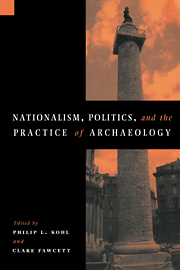Book contents
- Frontmatter
- Contents
- List of maps
- List of contributors
- Acknowledgments
- Part I Introduction
- Part II Western Europe
- 2 Civilization, barbarism, and nationalism in European archaeology
- 3 Archaeology and nationalism in Spain
- 4 Nationalism and Copper Age research in Portugal during the Salazar regime (1932–1974)
- 5 Archaeology in Nazi Germany: the legacy of the Faustian bargain
- 6 Nazi and eco-feminist prehistories: ideology and empiricism in Indo-European archaeology
- Part III Eastern Europe and Eurasia
- Part IV East Asia
- Part V Commentary
- Bibliography
- Index
3 - Archaeology and nationalism in Spain
Published online by Cambridge University Press: 06 October 2009
- Frontmatter
- Contents
- List of maps
- List of contributors
- Acknowledgments
- Part I Introduction
- Part II Western Europe
- 2 Civilization, barbarism, and nationalism in European archaeology
- 3 Archaeology and nationalism in Spain
- 4 Nationalism and Copper Age research in Portugal during the Salazar regime (1932–1974)
- 5 Archaeology in Nazi Germany: the legacy of the Faustian bargain
- 6 Nazi and eco-feminist prehistories: ideology and empiricism in Indo-European archaeology
- Part III Eastern Europe and Eurasia
- Part IV East Asia
- Part V Commentary
- Bibliography
- Index
Summary
The purpose of this chapter is to analyze the importance which the appearance of nationalism as a political doctrine had in the formation of archaeology as a scientific discipline in Spain. This question cannot be understood without first taking into account the complexity of the phenomenon of nationalism and the specificity of its development in Spain. Here a number of different nationalisms existed, and archaeological data were, therefore, interpreted from a nationalist perspective in a number of different and, to a certain extent, contradictory ways.
This article argues that in Spain, as in most of Europe, archaeology developed as the result of the need to find data which would permit the reconstruction of the remotest periods of the national past. The crystallization of the study of history for nationalist aims occurred in the nineteenth century, leading to the dramatic growth of historical studies in the universities, the creation of archives and libraries, and, finally, the funding of historical research, including archaeological excavations. However, one should not exaggerate the role of archaeology in the construction of national histories. Historical studies were centered fundamentally on the modern and medieval periods. The Romantic movement drew on medieval times for inspiration. Nevertheless, to a lesser degree during the nineteenth century, and to a greater extent in the twentieth, the growth of historical studies affected ancient history and prehistory and led to a greater recourse to archaeological data. In this way archaeology became politically charged.
- Type
- Chapter
- Information
- Nationalism, Politics and the Practice of Archaeology , pp. 39 - 56Publisher: Cambridge University PressPrint publication year: 1996
- 8
- Cited by



